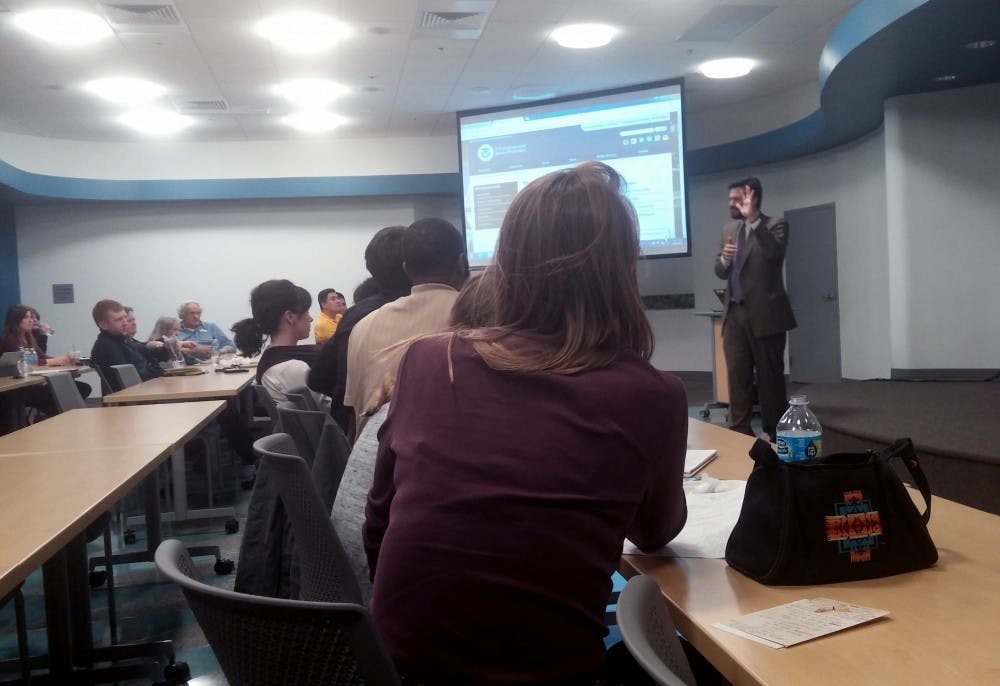When I walked into Downtown Phoenix's Westward Ho building on a crisp evening in late February, there was a spring in my step, fueled by my own self-confidence and pride. I was walking into a forum of ASU faculty and students, ready to engage in a discussion of constitutionality and recent laws, and I was completely assured of my ability to understand, and even contribute, to the discussion.
Jonathan Koppell, dean of the College of Public Service and Community Solutions, hosted the "What is Constitutional?" event, a group discussion on the Constitution and recent executive orders.
The event preceded a screening of President Trump's Feb. 28th Address to the Joint Sessions of Congress. During the event, faculty and students discussed a wide range of topics and debated the constitutionality of the president's recent actions.
Upon leaving, however, my steps were slow and my shoulders slumped under the heavy weight of my own ignorance. I was hyper aware of just how little I had been paying attention to the ever-turning world around me. One good thing about attending the event was that it opened my eyes to the gravity of staying informed and avoiding complacency at all costs.
Political fatigue is a very real threat. Diana L. Banister, a political strategist, told NPR that four potential causes of political fatigue are the misguided media, disgust with the process, widespread feeling that systems are too big to do any good, and disillusionment.
The electoral victory of Donald Trump took many Americans by surprise.
“It’s even exciting to see that a candidate, who most people would say had no possibility of getting elected got elected because a bunch of people voted in a way that nobody would have ever expected, and it’s a reminder that these elections are not foregone conclusions. They depend on our participation and what we as Americans do in these elections ultimately steers the electoral outcome,” said Koppell.
Atlantic staff writer Molly Ball said in her article "Donald Trump and the Politics of Fear" that "Americans are more afraid today than they have been in a long time ... Mass shootings form a constant drumbeat. Protests have shut down large cities repeatedly, and some have turned violent. Overall crime rates may be down, but a sense of disorder is constant."
Maeve Duggan and Aaron Smith found in their article for the Pew Research Center that "More than one-third of social media users are worn out by the amount of political content they encounter, and more than half describe their online interactions with those they disagree with politically as stressful and frustrating."
Sometimes, you just need to step back and breathe.
Enough. Enough falsehoods. Enough fear mongering. Enough political posturing. He wants ratings. Not from me. Turned it off. #JointAddress
— Michael Guay (@HeyMikeGuay) March 1, 2017
The only bad thing about giving yourself a break is that one break can turn into two, and two can turn into twenty if, like me, you aren’t careful enough.
I often find myself balking at recent politics and the injustice incited against people all around the world, so I turn away from the news and become absorbed in my own world, preferring it to political reality.
Yet this can prevent you from staying informed, and information is the key to your ability to incite change in these exciting, and often frightening, times.
"If there's one positive thing that's come from the events of the last several months, it's that there's a renewed interest in politics, there's a renewed ... understanding that elections matter and that votes matter and that there's a consequence to our participation or our lack of participation," Koppell said.
This participation is critical for college students. We’re all voting age, and our decisions in all manner of elections shape the future of our country, no matter how small or insignificant the act of filling out a bubble or writing a candidate’s name is.
Politicophobia can be conquered. It takes time, patience, and dedication, yet the rewards it reaps are bountiful.
The importance of civil engagement is undeniable. We can stay engaged members of society by staying informed.
Reach the reporter at sosulli2@asu.edu or follow @serenaeosully on Twitter.
Editor’s note: The opinions presented in this column are the author’s and do not imply any endorsement from The State Press or its editors.
Want to join the conversation? Send an email to opiniondesk.statepress@gmail.com. Keep letters under 500 words and be sure to include your university affiliation. Anonymity will not be granted.




